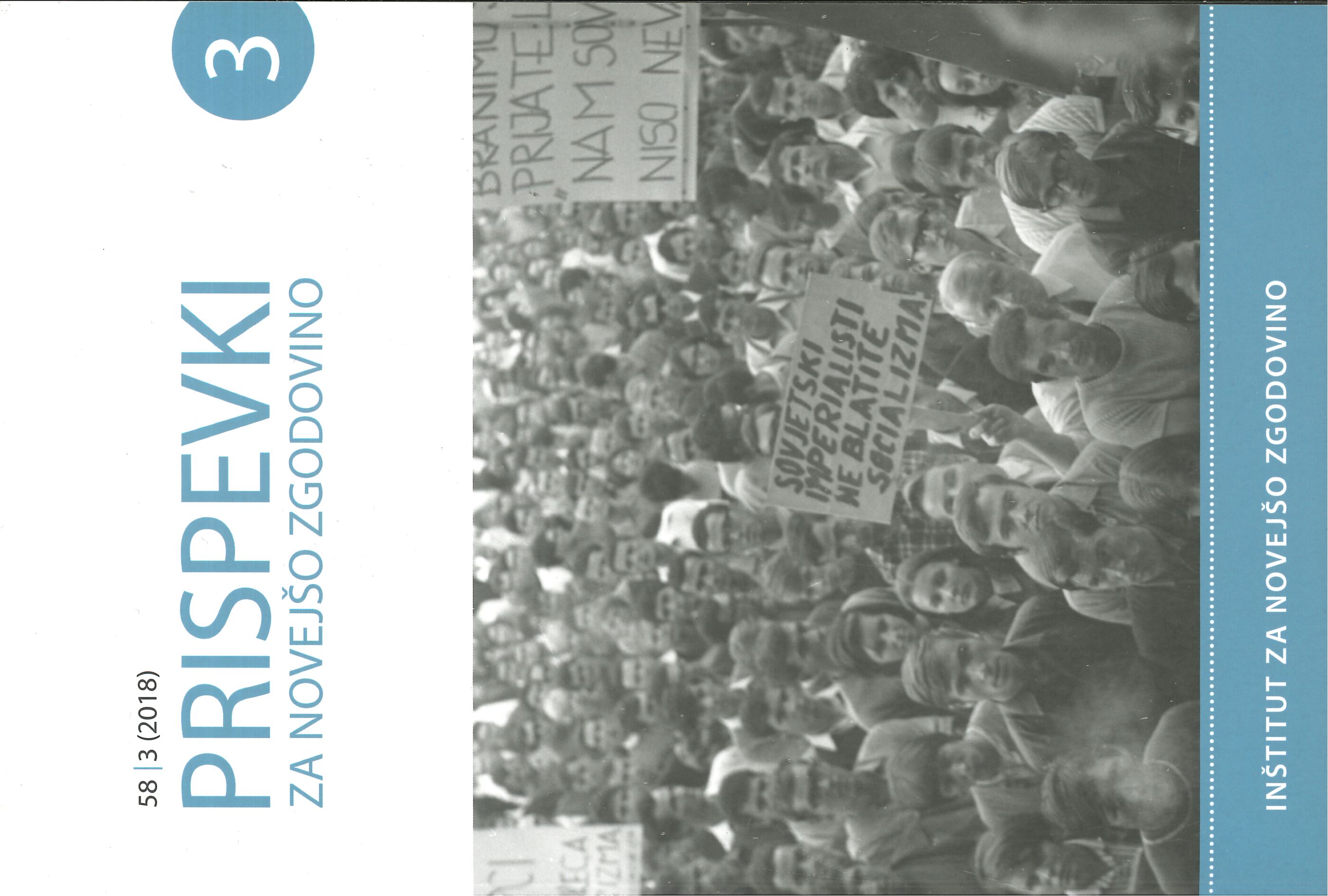The Contours of Social Criticism in Late-Socialist Slovenia
DOI:
https://doi.org/10.51663/pnz.58.3.08Abstract
Self-management socialism displayed ambiguities and vagueness in handling social controversy and public life in general, giving rise to numerous peculiarities particular to this social phenomenon in Yugoslavia. While a Leninist interpretation of democracy in socialism constituted the background of Edvard Kardelj’s recipe for “socially responsible criticism,” Yugoslavia and Slovenia were at the same time under the influence of western liberal concepts. Considering the political and ideological contexts of late socialism, the article discusses the systemic way of dealing with social criticism between the late 1960s and the mid-1980s, while trying to determine the impact of these circumstances on the subsequent evolvement of democratisation. Prior to the major social shifts of the second half of the 1980s, the “pluralism of self-management interests” could be articulated in practice primarily in a way that did not force it into competition with the Party. In those cases when this nevertheless occurred, the leading political establishment preferred to leave it to its “proxies” to deal with the transgressors, while itself taking on arbitrary positions that displayed some of the key features of the late-socialist regime in Slovenia.
References
Sources and Literature
Archival Sources:
• SI AS, Archives of the Republic of Slovenia:
- SI AS 1589/IV, Centralni komite Zveze komunistov Slovenije.
• HU OSA, Vera and Donald Blinken Open Society Archives:
- HU OSA-300-10-2, Yugoslav Subjects Files I.
Literature:
• Cvetković, Srđan. “(Ne)Tolerisani disidenti / specifičnost jugoslovenskog socijalizma 1953–1985.” In: Disidentstvo u suvremenoj povijesti, edited by Nada Kisić Kolanović, Zdenko Radelić, and Katarina Spehnjak, 105–28. Zagreb: Hrvatski institut za povijest, 2010.
• Cviić, Krsto. “Dinamika političke promjene unutar komunističke vlasti: primjer SFRJ.” In: Disidentstvo u suvremenoj povijesti, edited by Nada Kisić Kolanović, Zdenko Radelić, and Katarina Spehnjak, 23–40. Zagreb: Hrvatski institut za povijest, 2010.
• Dragovič-Soso, Jasna. “Spasioci nacije”: Intelektualna opozicija Srbije i oživljanje nacionalizma. Beograd: Edicija Reč, 2004.
• Flere, Sergej. “The Broken Covenant of Tito's People: The Problem of Civil Religion in Communist Yugoslavia.” East European Politics & Societies 21, No. 4 (2007): 681–703.
• Gabrič, Aleš. “Opozicija v Sloveniji po letu 1945.” Prispevki za novejšo zgodovino 45, No. 2 (2005): 97–119.
• Gabrič, Aleš. “Vloga intelektualca kot političnega subjekta v enostrankarskem sistemu.” In: Slovenija 1948–1998: iskanje lastne poti, edited by Stane Granda and Barbara Šatej, 158–68. Ljubljana and Maribor: Zveza zgodovinskih društev; Univerza v Mariboru, 1998.
• Gruenwald, Oskar. The Yugoslav Search for Man: Marxist Humanism in Contemporary Yugoslavia. South Hadley: Bergin, 1983.
• Höpken, Wolfgang. Sozialismus und Pluralismus in Jugoslawien. Entwicklung und Demokratiepotential des Selbsverwaltungssystems (München: R. Oldenbourg Verlag, 1984).
• Ivin, Daniel. “Pojav disidenata u socijalističkoj Jugoslaviji.” In: Dijalog povjesničara – istoričara 9, edited by Hans-Georg Fleck, 361–80. Zagreb: Zaklada Friedrich Naumann. 2005.
• Johnson, Chalmers. “Comparing Communist Nations.” In: Change in Communist Systems, edited by Chalmers Johnson, 1–32. Stanford: Stanford University Press, 1971.
• Kardelj, Edvard. Beležke o naši družbeni kritiki. Ljubljana: Delavska enotnost, 1985.
• Kardelj, Edvard. Smeri razvoja političnega sistema socialističnega samoupravljanja. Ljubljana: ČZP Komunist, 1977.
• Kolakovski, Leszek. Glavni tokovi marksizma. Tom III. Beograd: Beogradski izdavačko-grafički zavod, 1985.
• Komel, Dean. “Cenzura filozofije in filozofija cenzure.” In: Cenzurirano: Zgodovina cenzure na Slovenskem od 19. stoletja do danes, edited by Mateja Režek, 283–89. Ljubljana: Nova revija, 2010.
• Linz, Juan J. Totalitarian and Authoritarian Regimes. Boulder and London: Lynne Riener Publishers, 2000.
• Lowenthal, Richard. “Development vs. Utopia.” In: Change in Communist Systems, edited by Chalmers Johnson, 33–116. Stanford: Stanford University Press, 1971.
• Lusa, Stefano. Razkroj oblasti: slovenski komunisti in demokratizacija države. Ljubljana: Modrijan, 2012.
• Mastnak, Tomaž. “Socialistična civilna družba, demokratična opozicija.” Tribuna 12, 1985/1986, 8, 9.
• Matvejević, Predrag. “Samoupravljanje in kulturno ustvarjanje.” Sodobnost 27, No. 2 (1979): 185–99.
• Pirjevec, Jože. “Tito in Kardelj: od ‘tovarišije’ do sovraštva.” Annales, Series historia et sociologia 21, No. 2 (2011): 501–08.
• Pirjevec, Jože. Jugoslavija: Nastanek, razvoj ter razpad Karadjordjevićeve in Titove Jugoslavije. Koper: Lipa, 1995.
• Pollack, Detlef and Jan Wielgohs. “Comparative Perspective on Dissent and Opposition to Communist Rule.” In: Dissent and Opposition in Communist Eastern Europe, edited by Detlef Pollack and Jan Wielgohs, 231–66. Hants and Burlington: Ashgate, 2004.
• Repe, Božo. “Podobnosti in razlike med slovenskim (jugoslovanskim) in vzhodnoevropskim tipom socializma.” In: Evropski vplivi na slovensko družbo, edited by Nevenka Troha, Mojca Šorn, and Bojan Balkovec, 407–15. Ljubljana: Zveza zgodovinskih društev Slovenije, 2008.
• Rupel, Dimitrij. “Umetnostna proizvodnja in njene politike” Problemi 17, No. 188 (1979): 63–70.
• Shoup, Paul. “The Limits of Party Control: The Yugoslav Case.” In: Authoritarian Politics in Communist Europe: Uniformity & Diversity in One-Party States, edited by Andrew C. Janos, 176–96. Berkeley: Institute of International Studies, 1976.
• Tökés, Rudolf L. “Introduction.” In: Opposition in Eastern Europe, edited by Rudolf L. Tökés, xiii–xxiv. London and Basingstoke: Macmillan, 1979.
• Tomc, Gregor. “Cenzurirani punk: analiza primera cenzure Punk Problemov.” In: Cenzurirano: Zgodovina cenzure na Slovenskem od 19. stoletja do danes, edited by Mateja Režek, 235–46. Ljubljana: Nova revija, 2010.
• Žižek, Slavoj. Did Somebody Say Totalitarianism? Five Interventions in the (Mis)use of a Notion. London and New York: Verso, 2001.
Published
Issue
Section
License
Authors who publish with this journal agree to the following terms:
- Authors retain copyright and grant the journal right of first publication with the work simultaneously licensed under a Creative Commons Attribution License that allows others to share the work with an acknowledgement of the work's authorship and initial publication in this journal.
- Authors are able to enter into separate, additional contractual arrangements for the non-exclusive distribution of the journal's published version of the work (e.g., post it to an institutional repository or publish it in a book), with an acknowledgement of its initial publication in this journal.
- Authors are permitted and encouraged to post their work online (e.g., in institutional repositories or on their website) prior to and during the submission process, as it can lead to productive exchanges, as well as earlier and greater citation of published work (See The Effect of Open Access).


